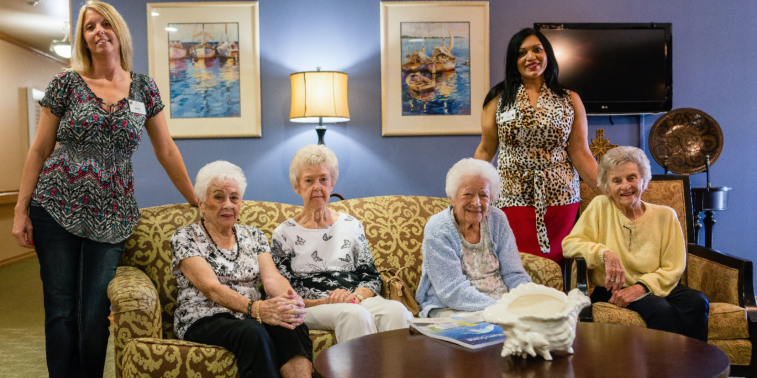Memory Care Facilities Charlotte: Creating a Secure and Nurturing Community
Memory Care Facilities Charlotte: Creating a Secure and Nurturing Community
Blog Article

Recognizing Mental Deterioration Treatment: A Guide for Loved Ones
The complexities of dementia treatment require a nuanced understanding that prolongs past basic expertise of the problem itself. For liked ones, identifying the early symptoms and executing effective communication methods are important in promoting an encouraging atmosphere. Caregivers must not overlook their very own health, as it significantly influences their capacity to offer caring care. As we explore these important parts, it ends up being noticeable that the trip of comprehending mental deterioration treatment is not practically the private impacted, yet also about the intricate characteristics that form their experiences and partnerships. What understandings can change this journey?
What Is Dementia?
Mental deterioration is a collective term that incorporates a variety of cognitive disabilities defined by a decline in memory, assuming, and social abilities serious sufficient to interfere with daily life. It is not a details disease yet rather an umbrella term that includes various types of cognitive conditions, with Alzheimer's illness being the most widespread. Other forms consist of vascular mental deterioration, Lewy body dementia, and frontotemporal mental deterioration, each with unique attributes and underlying reasons.
The onset of dementia normally includes progressive cognitive decrease, impacting the person's ability to carry out daily jobs and engage meaningfully with others. These problems can manifest as difficulties with interaction, problem-solving, and judgment. As dementia advances, people might experience modifications in state of mind and actions, which can better complicate their care and social communications.
Recognizing mental deterioration is important for family members, caregivers, and healthcare professionals to provide appropriate support and treatments. Early diagnosis and intervention can assist take care of signs and enhance the lifestyle for those affected. Additionally, it cultivates a deeper understanding of the obstacles encountered by individuals with mental deterioration, highlighting the significance of thoughtful treatment and support throughout their journey.
Identifying the Signs
Identifying the signs and symptoms of dementia early is critical for effective intervention and support - memory care facility charlotte. Dementia includes a variety of cognitive impairments that can manifest in numerous means, typically impeding daily performance and high quality of life. Typical very early symptoms include amnesia, specifically forgetting current occasions or conversations, which might at first be disregarded as regular aging
As the condition progresses, individuals may exhibit problems with problem-solving, preparation, or completing acquainted jobs, such as managing finances or following a dish. Complication regarding time or area usually develops, causing disorientation and anxiety. Modifications in mood and habits are additionally significant signs; people might end up being taken out, irritable, or exhibit apathy towards activities once delighted in.
Furthermore, difficulties in language can surface, materializing as trouble in finding the right words or following conversations. Recognizing these signs early can assist in timely medical evaluation and care preparation. It is necessary to come close to these monitorings with level of sensitivity and understanding, as they can be stressful for both the individual and their enjoyed ones. Prompt focus to these indicators can cause better end results and support for those impacted by dementia.
Effective Interaction Techniques

Non-verbal signs play an essential function in communication. Preserving eye call, using proper face expressions, and using motions can assist convey your message a lot more successfully. Furthermore, developing a distraction-free setting can better facilitate meaningful interactions.
Active listening is crucial; give the person ample time to respond without disrupting. Validate their feelings and experiences, which cultivates depend on and motivates open dialogue. When reviewing familiar subjects or memories, make use of triggers to direct the conversation, helping them feel engaged and valued.
Lastly, be prepared to adjust your approach based on the individual's existing cognitive state. Flexibility in interaction techniques makes sure that you continue to be connected, enhancing the relevance of your relationship. By implementing these strategies, you can develop an encouraging ambience that urges positive communications with individuals influenced by dementia.
Creating a Helpful Setting
Creating a helpful environment is necessary for improving the high quality of life for people with mental deterioration. This atmosphere ought to focus on convenience, familiarity, and safety to reduce anxiety and complication.
Incorporating regimens can offer a sense of security. Predictable routines help people with dementia comprehend what to expect throughout the day, thus reducing sensations of disorientation. Customizing the space with acquainted things, pictures, and keepsakes can stimulate positive memories and develop a sense of belonging.
In addition, think about the sensory elements of the environment. Soft colors, calming fragrances, and mild noises can add to a peaceful environment. Equilibrium stimulation to prevent overwhelming the person; silent areas for relaxation should complement much more energetic areas for social interaction.
Self-Care for Caregivers
Sustaining people with mental deterioration needs not just a well-structured atmosphere yet likewise attention to the well-being of caregivers. Caregivers usually encounter psychological, physical, and psychological difficulties that can result in burnout if not effectively resolved. Prioritizing self-care is important to preserve their health and effectiveness in giving treatment.
First, caretakers should develop a regular routine that includes time for personal activities and relaxation. Taking part in leisure activities, workout, or just walking can substantially reduce anxiety. It is essential to maintain find more info a balanced diet regimen and ensure sufficient sleep to enhance physical durability.
Furthermore, caregivers must look for social assistance. This can be accomplished by joining support groups, engaging with buddies, or speaking with relative regarding their feelings and experiences. Such links assist caretakers really feel less isolated and provide useful emotional outlets.
Lastly, caregivers ought to not wait to look for expert assistance when needed. Consulting mental wellness specialists can assist in developing coping approaches and provide devices for handling the psychological toll of caregiving. By actively exercising self-care, caregivers can boost their wellness, inevitably profiting both themselves and the people they take care of.
Verdict
In conclusion, understanding dementia care is vital for improving the high quality of life for individuals affected by this condition. Additionally, prioritizing self-care for caretakers guarantees their health, inevitably benefiting both caretakers and those obtaining care.
As we explore these essential components, it comes to be obvious that the trip of comprehending mental deterioration care is not simply regarding the individual influenced, however also regarding the intricate dynamics that shape their experiences and relationships. Other types include vascular dementia, Lewy body dementia, and frontotemporal mental basics deterioration, each with distinct qualities and underlying reasons.
As mental deterioration proceeds, individuals may experience modifications in state of mind and behavior, which can better complicate their care and social interactions.
Furthermore, it promotes a deeper understanding of the obstacles encountered by people with mental deterioration, highlighting the relevance of caring treatment and support throughout their journey.
In conclusion, understanding mental deterioration care is important for improving the top quality of life for people affected by this condition. (charlotte care home)
Report this page